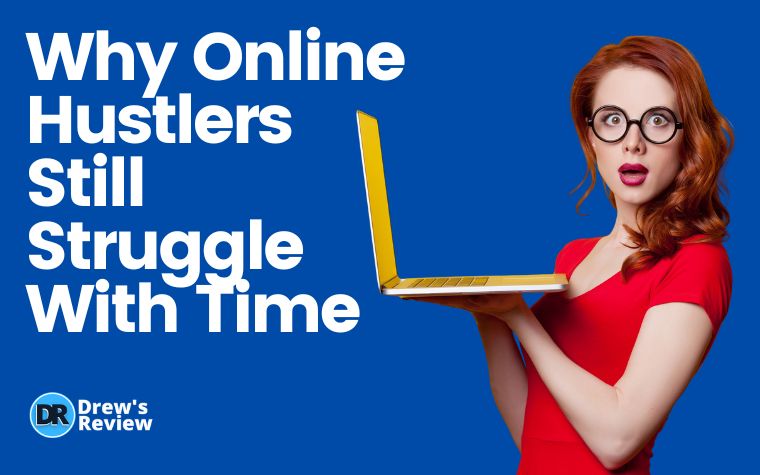
Let’s be honest here. The grind looks great online. You get up early, grab your iced coffee, open your laptop and start churning out tasks like you’re building your own little empire.
But somewhere between “I’ll just finish this quick email” and midnight scrolling through analytics, your day is already over.
It’s not laziness. It’s leakage. Time quietly drifts away in ways even every day online entrepreneurs hardly even notice.
You’re not alone if you’ve ever said, “I worked all day but got nothing done.” It's basically motion without progess.
If you want to stay ahead, you can Catch today's trending topics on smarter work systems that keep creators and freelancers from burning out while trying to get ahead.
Let’s unpack what’s really going on behind that glowing screen.
1. The Myth of Infinite Energy
The internet doesn’t sleep, and that’s both its magic and its trap.
Most digital hustlers build their schedules around opportunities, rarely with rhythm. You’ll work at 2 a.m. because the idea’s fresh, then crash mid-afternoon because your body has just given up, or didn't drink enough coffee. Has that ever happened to you?
Here’s the thing. Your real currency is energy, not time. You can’t stretch 24 hours, but you can manage those hours by how alert, creative, or strategic you are inside them.
Peak performance isn’t a constant state but rather a rhythm. The smartest creators know when their minds are sharpest and do most of their work within that window. Morning for writing. Afternoon for admin. Evening for rest or reflection. This works for most.
If your day feels like chaos, it’s not the workload. It’s really just the lack of rhythm.
2. The Fake Efficiency Trap
You are quick to check notifications and reply fast. You switch between editing, messaging, and planning without pause. Feels productive, am I right?
Multitasking isn’t real productivity though. It’s just distracting yourself and calling it progress.
Cognitive science says switching tasks can lower efficiency by up to 40%.
That means you’re losing almost half your day to mental friction you don’t even notice.
Try single-threading your focus. Block 90-minute chunks for one task and silence everything else. Then, take an intentional five-minute reset and stretch, breathe, or just stare at nothing. Whatever it takes!
It sounds simple, but it’s a game-changer. Speed comes from flow, not working like crazy.
3. Overbuilding Systems That Don’t Serve You
Every online entrepreneur loves a new productivity tool and there's many out there like ClickUp, Notion, Airtable — all shiny dashboards that promise order.
But here’s the uncomfortable truth. Many hustlers spend more time organizing their workflow than actually working. Doesn't that sound ridiculous?
You end up building systems for a business that doesn’t even exist yet.
A simpler setup you actually use beats a complex one that doesn't impress anyone at all. Before adding a tool, ask yourself: “Does this remove friction or just feel productive?”
If it doesn’t make your work quicker, simpler, or clearer, it’s just digital clutter pretending to be useful.
4. The Endless “Content Chase”
Every online creator hits a treadmill of constant posting. Instagram reels, newsletters, tweets, blogs, threads. You’re not building; you’re broadcasting.
Content is essential but not all content compounds.
The biggest time waster isn’t creating too much — it’s creating without a purpose in mind.
Ask yourself:
- Does this post lead somewhere meaningful?
- Will it drive conversation, traffic, or sales?
- Could I repurpose it later?
If not, you’re probably feeding algorithms more than your business.
Create less. Distribute smarter. Impact will beat frequency almost every time.
So, the next time you feel overwhelmed, don’t ask how to do more. Ask yourself what’s really worth your time.
5. The Invisible Weight of Context Switching
If you’re a solopreneur, you’re not just a marketer — you’re the editor, the accountant, the customer support rep, and the project manager all in one. So you wear many hats!
That’s normal in the early days, but switching roles too often impedes with your focus. Each transition costs you mental startup time which is the energy you need to reset your attention.
Batch your roles instead.
- Mondays for creative work
- Tuesdays for admin
- Wednesdays for outreach
Having structure will create freedom, not restriction. When your brain knows what kind of work to expect, you'll have much less resistance.
6. Saying Yes to Everything (and Everyone)
Online hustle culture is often associated with with chasing opportunities.
New client? Sure. Collaboration? Absolutely. Guest podcast? Why not. But every “yes” steals focus from what really matters in the long run.
Here’s is a paradox: you think saying yes expands opportunity, but it can actually dilute it.
The top 1% of digital entrepreneurs are ruthless about filtering commitments. They have the ability to say NO faster. They automate sooner and outsource later.
Now, it's not because they are lazy, it's because they understand leverage.
7. Digital Clutter Feels Harmless Until It Isn’t
Does this sound familiar? Dozens of open tabs, files named things like “final_version_v9,” and constant pings from every app imaginable splitting your focus.
It doesn’t look serious, but clutter is just noise and very distracting. Every time you scroll through chaos, your brain burns energy and it gets confusing deciding what matters most.
A clean digital environment is like a clean desk as it calms the nervous system.
Here's what you should do. Do a five-minute cleanup ritual at the end of each workday. Close tabs, sort downloads, reset your task list. While it may be boring, it’s how professionals protect focus. Try it!
8. The Illusion of Busy Metrics
Let’s talk about vanity data such as likes, views, and open rates. While it might feel like validation, it's really just distraction.
Here's a thought - you can’t deposit likes in a bank account.
Real growth happens in boring numbers like retention, conversion, and profit margin. However, those metrics are harder to face because they reveal the truth. Is it possible the hustle isn’t as efficient as it looks?
Data is not the enemy but selective data is. Measure what drives outcomes, not ego.
9. Working in Bursts, Not Systems
The “sprint until you crash” pattern is almost like a badge of honor online.
Creators brag about 16-hour days, then disappear for a week. It’s unsustainable — physically and mentally.
Consistency always beats intensity. A three-hour focused block daily works much better than crazy bursts of inspiration.
Even creative work can benefit from routine. Inspiration doesn’t disappear, it just visits more often when it knows where to find you.
10. The Missing Ingredient: Rest That Actually Restores
Here’s something most online entrepreneurs misunderstand — rest isn’t absence of work. It’s fuel for it.
Scrolling isn’t rest. Watching “productivity hacks” isn’t rest.
Real rest means letting go of the part of you that’s always tied to getting things done.
Do you remember the last time you did something that had no outcome? For example, you may have cooked a meal just because. Walked without headphones. Called someone for no reason and on and on.
These simple moments of pause will do more to recharge your creativity than any caffeine-fueled rush ever will.
11. The False Romance of Constant Hustle
The word “hustle” used to mean ambition. Now it’s just a code for exhaustion.
The narrative will say if you’re not grinding, you’re falling behind. But what's the truth? You’re not competing with anyone’s timeline but really it's just your own.
Having sustainable success online isn’t about doing more, it’s about designing smarter loops. Try to automate repetitive work. Delegate early. Use AI to handle structure so you can focus on substance.
Grind is temporary. Systems are forever.
12. Reclaiming Time by Redefining Worth
Time is often not just a resource. It’s a reflection of what you value.
If you’re always “too busy,” it might mean you’re busy doing the wrong things. If you’re always “behind,” it might mean your expectations need to be looked at.
Leverage isn’t about speed — it’s about clarity.
Do this test and start tracking where your hours actually go for one entire week. Be brutally honest. Then, cut the 20% of tasks that are useless.
The moment you see where time hides, you’ll never treat it carelessly again.
13. The Quiet Shift That Changes Everything
Eventually, every online entrepreneur faces the same question: “Do I work for my business, or does it work for me?”
Those who learn to prioritize energy instead of hours will always find freedom faster. They stop trying to keep up the rush and instead focus on building structure such as routines, habits, and systems that keep things moving with minimal effort.
Conclusion
Freedom online isn’t earned through harder work. It’s engineered through awareness.
- 5 Best Formation Companies Reviewed 2025 - October 8, 2025
- Why Online Hustlers Still Struggle With Time - October 7, 2025
- Cloudways Hosting Review: Features, Performance, and Pricing Analyzed - October 6, 2025
